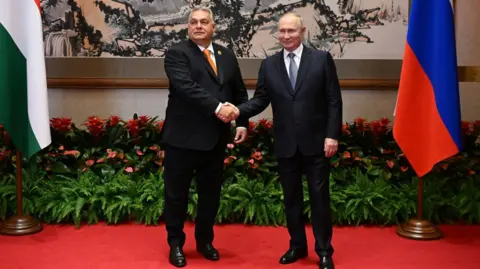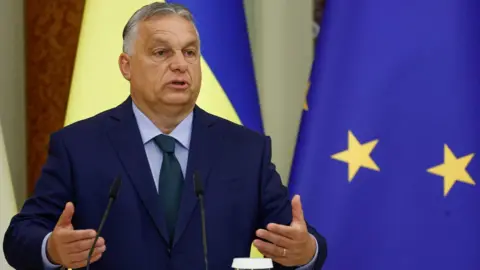Hungary’s PM meets Putin in Moscow for talks on Ukraine
Hungary’s Prime Minister Viktor Orban has met Russian President Vladimir Putin in Moscow for talks on the war in Ukraine.
The visit has been criticised by EU leaders, who have emphasised that Mr Orban is not acting on behalf of the bloc.
Mr Orban is the EU’s only head of national government to have kept close ties to the Kremlin following its full-scale invasion of Ukraine in 2022.
He described the trip as a “peace mission” in a post on X. It comes days after he visited Kyiv, where he spent three hours with Ukraine’s President Volodymyr Zelensky on Tuesday.
Both legs of the trip were carefully choreographed to emphasise Mr Orban as a global statesman, rather than an outsider.
Hungary has just taken over the presidency of the Council of the European Union, and will hold it to the end of the year.
Viktor Orban, speaking in Moscow, said: “Hungary will slowly become the last European country that can talk to everyone.”
The Kremlin said on Friday that talks between the two leaders would last at least two or three hours, but could go on “as long as needed”.
Officials are accompanying them, but there is a possibility they could speak one to one.
In footage of the meeting, Mr Putin said Mr Orban was visiting “not just as a long-time partner” but as a European Union representative.
However, European leaders openly condemned the Moscow trip and emphasised he was not representing the EU.
“The EU rotating presidency has no mandate to engage with Russia on behalf of the EU,” Charles Michel, President of the European Council, wrote on X.
“The European Council is clear: Russia is the aggressor, Ukraine is the victim. No discussions about Ukraine can take place without Ukraine.”
“Appeasement will not stop Putin,” European Commission head Ursula von der Leyen wrote on X.
Who is Viktor Orban, Hungarian PM with 14-year grip on power?
Russia’s president told Mr Orban he would be happy to discuss “the nuances” of his recent Ukraine ceasefire plan, in which he offered talks if Ukraine pulled out of four regions Russia claims to have annexed – an area which includes territory Russia does not currently occupy.
Volodymyr Zelensky has long said Ukraine will not negotiate with Moscow until Russian forces leave all Ukrainian territory, including Crimea.
The Kremlin leader voiced a number of tough pre-conditions for negotiations, but Kyiv and its Western allies say these would be tantamount to Ukraine’s capitulation.
Earlier this week, Mr Orban visited Kyiv, saying “a quick ceasefire could be used to speed up peace negotiations”.
President Zelensky – who has had frosty relations with Mr Orban – did not publicly respond to the proposal.
Ahead of Ukraine’s offensive last summer, Mr Orban warned that Ukraine cannot win on the battlefield.
Since the start of Russia’s full-scale invasion in February 2022, the Hungarian prime minister has underlined that Russia’s advantage in resources and men makes Putin’s country unbeatable.
However, many Ukrainians believe any ceasefire would simply cement Russia’s hold over territory it has seized from Ukraine and, if negotiations were to take place, they would prefer them to be conducted from a position of strength rather than on the back foot.
Mr Orban has been a vocal critic of Western support for Ukraine. He previously slowed agreement on a €50bn ($54bn; £42bn) EU aid package designed to support Ukraine in its defence against Russia.
Tuesday’s visit to Kyiv was his first in 12 years, while he met Mr Putin repeatedly during that time.
During Mr Orban’s joint appearance with Mr Zelensky, the body language between them was not warm, and neither took questions from the media after they gave their statements.
But for the next six months Mr Orban’s position as head of the Council of the European Union means he has an influential role as a figurehead for Europe.
His visit to Kyiv came on his second day in that role, saying there was a need to solve previous disagreements and focus on the future.



